Filter by
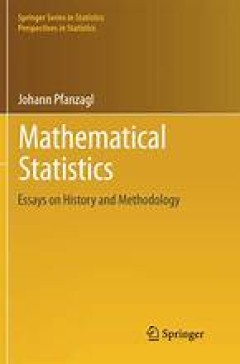
Mathematical Statistics
This book presents a detailed description of the development of statistical theory. In the mid twentieth century, the development of mathematical statistics underwent an enduring change, due to the advent of more refined mathematical tools. New concepts like sufficiency, superefficiency, adaptivity etc. motivated scholars to reflect upon the interpretation of mathematical concepts in terms of t…
- Edition
- 1
- ISBN/ISSN
- 978-3-642-31084-3
- Collation
- Mathematics
- Series Title
- Springer Series in Statistics
- Call Number
- 510
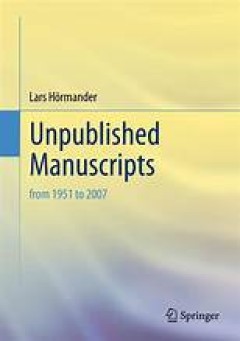
Unpublished Manuscripts
This book presents, for the first time, the unpublished manuscripts of Lars Hörmander, written between 1951 and 2007. Hörmander himself organised the manuscripts and also wrote the notes explaining their origins, presenting the material in the form he fully intended it to be published in. As his daughter, Sofia Broström, mentions in the Foreword, towards the end of his life, Hörmander "care…
- Edition
- 1
- ISBN/ISSN
- 978-3-319-69850-2
- Collation
- Mathematics
- Series Title
- -
- Call Number
- 510

The Real and the Complex: A History of Analysis in the 19th Century
This book contains a history of real and complex analysis in the nineteenth century, from the work of Lagrange and Fourier to the origins of set theory and the modern foundations of analysis. It studies the works of many contributors including Gauss, Cauchy, Riemann, and Weierstrass. This book is unique owing to the treatment of real and complex analysis as overlapping, inter-related subject…
- Edition
- 1
- ISBN/ISSN
- 978-3-319-23715-2
- Collation
- Mathematics
- Series Title
- Springer Undergraduate Mathematics Series
- Call Number
- 510
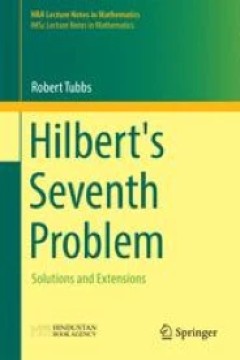
Hilbert's Seventh Problem Solutions and Extensions
This exposition is primarily a survey of the elementary yet subtle innovations of several mathematicians between 1929 and 1934 that led to partial and then complete solutions to Hilbert’s Seventh Problem (from the International Congress of Mathematicians in Paris, 1900). This volume is suitable for both mathematics students, wishing to experience how different mathematical ideas can come toge…
- Edition
- -
- ISBN/ISSN
- 978-981-10-2645-4
- Collation
- IX, 85
- Series Title
- -
- Call Number
- 521 TUB h
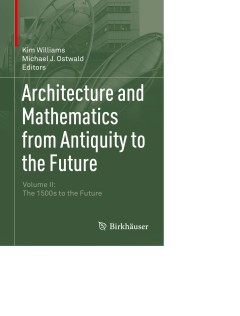
Architecture and Mathematics from Antiquity to the Future: Volume II: The 150…
Every age and every culture has relied on the incorporation of mathematics in their works of architecture to imbue the built environment with meaning and order. Mathematics is also central to the production of architecture, to its methods of measurement, fabrication and analysis. This two-volume edited collection presents a detailed portrait of the ways in which two seemingly different discipli…
- Edition
- Ed. 1
- ISBN/ISSN
- 978-3-319-00143-2
- Collation
- XIX, 690
- Series Title
- -
- Call Number
- 624.183 ARC a
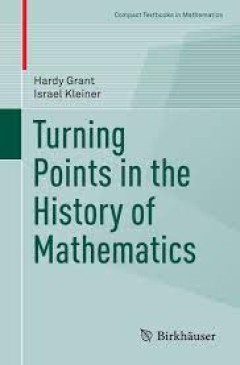
Turning Points in the History of Mathematics
This book explores some of the major turning points in the history of mathematics, ranging from ancient Greece to the present, demonstrating the drama that has often been a part of its evolution. Studying these breakthroughs, transitions, and revolutions, their stumbling-blocks and their triumphs, can help illuminate the importance of the history of mathematics for its teaching, learning, and …
- Edition
- -
- ISBN/ISSN
- 978-1-4939-3264-1
- Collation
- -
- Series Title
- -
- Call Number
- -

Turing’s Revolution The Impact of His Ideas about Computability
This book provides an overview of the confluence of ideas in Turing’s era and work and examines the impact of his work on mathematical logic and theoretical computer science. It combines contributions by well-known scientists on the history and philosophy of computability theory as well as on generalised Turing computability. By looking at the roots and at the philosophical and technical infl…
- Edition
- -
- ISBN/ISSN
- 978-3-319-22156-4
- Collation
- -
- Series Title
- -
- Call Number
- -

The Early Period of the Calculus of Variations
This monograph explores the early development of the calculus of variations in continental Europe during the Eighteenth Century by illustrating the mathematics of its founders. Closely following the original papers and correspondences of Euler, Lagrange, the Bernoullis, and others, the reader is immersed in the challenge of theory building. We see what the founders were doing, the difficulties …
- Edition
- 1
- ISBN/ISSN
- 978-3-319-38945-5
- Collation
- XII, 293, 59 b/w illustrations
- Series Title
- -
- Call Number
- -

The Complex Itinerary of Leibniz’s Planetary Theory The Complex Itinerar…
This book presents new insights into Leibniz’s research on planetary theory and his system of pre-established harmony. Although some aspects of this theory have been explored in the literature, others are less well known. In particular, the book offers new contributions on the connection between the planetary theory and the theory of gravitation. It also provides an in-depth discussion of Kep…
- Edition
- 1
- ISBN/ISSN
- 978-3-319-21236-4
- Collation
- X, 188,
- Series Title
- Science Networks. Historical Studies
- Call Number
- -
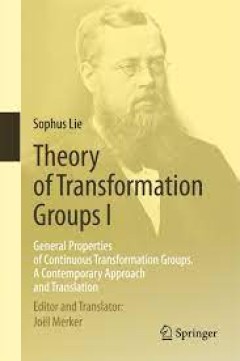
Theory of Transformation Groups I General Properties of Continuous Transform…
This modern translation of Sophus Lie's and Friedrich Engel's “Theorie der Transformationsgruppen I” will allow readers to discover the striking conceptual clarity and remarkably systematic organizational thought of the original German text. Volume I presents a comprehensive introduction to the theory and is mainly directed towards the generalization of ideas drawn from the study of example…
- Edition
- -
- ISBN/ISSN
- 978-3-662-46211-9
- Collation
- -
- Series Title
- -
- Call Number
- -
 Computer Science, Information & General Works
Computer Science, Information & General Works  Philosophy & Psychology
Philosophy & Psychology  Religion
Religion  Social Sciences
Social Sciences  Language
Language  Pure Science
Pure Science  Applied Sciences
Applied Sciences  Art & Recreation
Art & Recreation  Literature
Literature  History & Geography
History & Geography